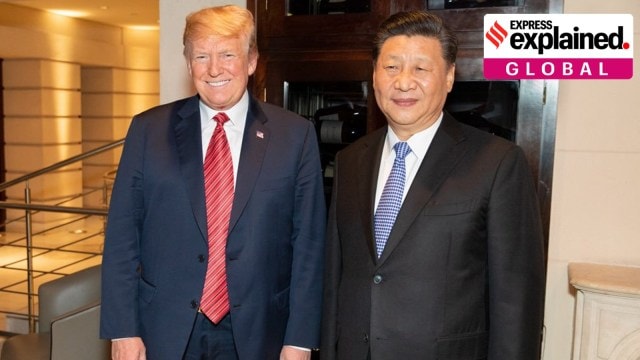As Donald Trump takes a wrecking ball to America’s relationships with countries around the world, his words and actions on two occasions in the Oval Office have triggered the most alarm and strongest reactions.

The first incident, on February 28, marked a remarkable break in US policy towards Ukraine that European countries saw as fundamentally undermining the transatlantic alliance and the democratic principle.
Story continues below this ad
The second, on February 4, amounted to a virtual abandonment of the two-state solution by the US, and was immediately rejected by the Arab world.
While Russia expressed delight after Zelenskyy was rebuked, China, the most significant ally of the Kremlin, issued no official reaction. The Chinese, who have been increasingly active diplomatically in West Asia of late, did say they rejected the displacement of the people of Gaza, but did not name Trump or the US in their statement.
What is China, the world’s second most powerful country, thinking at this extraordinary moment? Reporting and commentary in the Global Times and China Daily, two prominent English-language outlets of China’s state-run media, and the English version of People’s Daily, the mouthpiece of the Chinese Communist Party, provide some insights.
On Trump-Zelenskyy, Ukraine
Following the Oval Office meeting, Chinese media commentary has focused on the weakening of the US-led Western political order, and the perils of relying on the US for support.
Story continues below this ad
On March 1, People’s Daily published an opinion article titled, “How not to conduct diplomacy: Lessons from a White House dispute,” stressing the need for dialogue among international actors.
“It is a fallacy to assume that peace in Ukraine hinges solely on a bilateral agreement between the American and Russian presidents,” it said, possibly suggesting that Beijing must have a role. “Any such agreement, even if it existed before the Trump-Zelensky meeting at the White House, would have been detached from the broader geopolitical realities.”
The article underlined the fundamental wisdom of holding negotiations behind closed doors. “When negotiations become spectacle, as was the case in the White House confrontation, the risk of posturing overtaking substance increases dramatically,” it said.
A day later, an editorial (“‘Great television’ underscores changes underway”) noted the meeting was “a stark reminder of the shifting dynamics of global diplomacy and the challenges faced by nations navigating an increasingly unpredictable international landscape”.
Story continues below this ad
The planned deal on Ukraine’s minerals, which “had drawn criticism for its seemingly exploitative nature”, had been “originally mooted by Kyiv, for whom it represents a painful but necessary compromise in the face of current realities”, it noted.
The Oval Office blow-up appeared to be “a carefully orchestrated setup”, which “offered a gripping and revealing glimpse into the realpolitik of the Trump administration”, the editorial said. It cautioned the European Union that “this episode should serve as a wake-up call: the era of relying on US security guarantees may be coming to an end” – and contrasted the American approach with that of China.
“As the US under the Trump administration increasingly retreats from international responsibilities, the concept of a “US-led West” is receding into history,” it said. “China, for its part, has consistently advocated for dialogue and consensus-building to achieve a peaceful resolution to the conflict in Ukraine. Beijing’s vision of a community with a shared future for mankind is rooted in the principles of multipolarity and mutual respect.”
Global Times, in an article published on March 1 (“White House shouting match between Trump, Zelensky ‘rare, dramatic’ in history of modern intl relations: expert”), said the events “demonstrated to the Trump administration that ending the crisis might be more challenging than it had initially planned”.
Story continues below this ad
On March 2, Global Times said Western countries “are reeling not only because of the battlefield and Europe’s security future, but also the painful realization that under US’ “America First” approach, the transatlantic alliance is under risk of changing from one of shared values to a transactional relationship.” (“European leaders gather in haste following Trump-Zelensky row”)
On Trump’s plan to redevelop Gaza
Since the Hamas attack of October 7, 2023, and the Israeli military offensive that has all but flattened Gaza, China has officially called for peace and talked about a long-term solution to the Israeli-Palestinian conflict. State media has published criticisms of the US and Israel, and pointed to Chinese aid for Gaza.
While China has trade and diplomatic ties with Israel, Foreign Minister Wang Yi emphasised on March 7 that “Gaza belongs to the Palestinian people, and is an inseparable part of the Palestinian territory”. Wang said China supported the plan for Gaza proposed by Egypt and other Arab countries on March 4.
There was comparatively less commentary in Chinese media following Trump’s initial announcement, but it underlined China’s basic position.
Story continues below this ad
The Global Times reported comments by a spokesperson that “Palestinians governing Palestine” should be the fundamental principle of post-conflict governance of Gaza. The article quoted a Chinese professor as saying, “Gaza is Palestinian territory, belonging to its people — not the US or any other country. Its future should not be dictated by the US.” (“China opposes forced displacement of the people in Gaza: Chinese FM”, February 5)
An explainer published in People’s Daily on February 7 collated the reactions of major powers and Western media outlets. “BBC highlighted that Trump’s Gaza plan “will be seen as flying in the face of international law”, while CNN called Trump’s Gaza plan “the most outlandish idea in the history of U.S. Middle East peacemaking,” it noted.








































